For over ten years I had eczema on my face, elbows, knees, arms, and hands. Using homeopathy and natural remedies for eczema relief, improving my gut health, and quitting cortisone cream allowed me to finally cure my eczema for good. I’m now going on five years eczema free. Read about my story.
Let me start off by saying that my journey to fully healed eczema was a long one. I have made great strides with lots of effort, patience, and perseverance. I previously had eczema on my face, elbows, knees, arms, armpits, and hands. Now, I’ve been eczema free for five years!
The methods I explain in this blog also helped me to heal. However, healing is a learning process.
While reading this blog, remember that everyone’s body is different. What is best for your skin and health, might not be exactly the same as what was best for my own.
This is just my personal story. Always talk to your healthcare provider before trying new self-care routines.
Eczema History
Eczema, also known as atopic dermatitis, is caused by a combination of immune system activation, genetics, environmental triggers and stress. Eczema was described and named atopic dermatitis in 1933 by Fred Wise and Marion Sulzberger, but it definitely existed before it was named.
So how did eczema originate? If you have eczema, your immune system overreacts to small irritants or allergens and this type of overreaction inflames your skin. This means eczema has probably been around forever. Environmental triggers and stressors that can cause eczema have increased over time, increasing the rate of eczema in the human population.
Most often, eczema is caused by external chemicals that irritate the skin. These chemicals can be in skin care, moisturizer, makeup, laundry detergent, fabrics, fabric dye, household cleaners, foods, pesticides, and synthetic materials.
For instance, my eczema triggers include latex, sulfites, sulfates, triclosan, parabens, phthalates, food dye, some synthetic fabrics, nickel, and synthetic fragrances.
Is Eczema Hereditary?
While scientists are still learning more about eczema, evidence suggests there is some evidence that eczema may partially be hereditary. Most researchers speculate that eczema is more likely a result of environmental exposures, and families usually share environmental exposures.
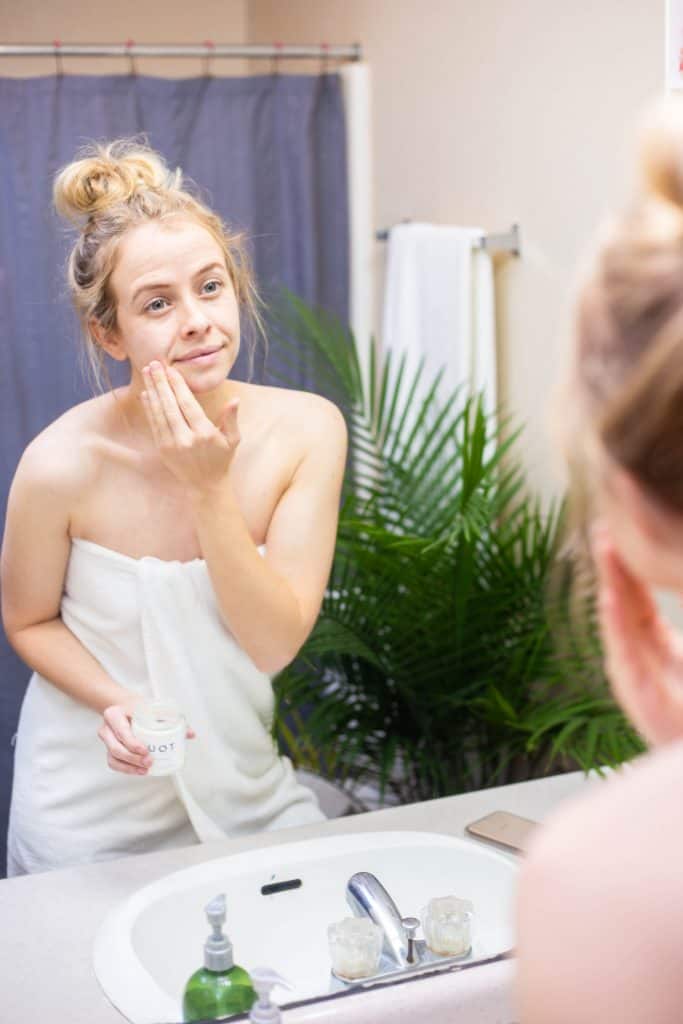

Follicular Eczema and Papular Eczema
Follicular eczema and papular eczema are similar; both cause raised bumps that mimic the look of acne. What is the difference between follicular eczema and papular eczema? Both follicular and papular eczema cause rashes of raised bumps, but follicular eczema specifically affects the hair follicle.
I experienced both on my arms and some follicular eczema on my scalp.
It is common for eczema sufferers to experience more than one type of eczema at a time. I mainly dealt with dyshidrotic eczema on my hands and contact dermatitis everywhere else.
Adult-Onset Eczema
It was tough having adult-onset eczema. I had struggled with eczema on and off in high school, but it got much worse in college. I was stressed all the time, eating very poorly, not nourishing my body correctly, struggling with gut health, drinking a lot, and buying cheap skincare.
When I finally learned about my skin microbiome in advanced microbiology at LSU, I knew something had to change.
Four things motivated me to pursue healing my skin for good.
1. Constant skin inflammation can lead to skin cancer.
2. I felt ugly. My confidence was low, and I was living my life around my eczema.
3. Long-term steroid cream use causes glaucoma… and I had eczema around my eyes. My vision was getting worse every month because all I knew to do to relieve the itching was to use a steroid cream on my face (as my doctor told me to).
4. While getting my degree in microbiology I fell in love with microbes. Especially the microbes making up my body’s ecosystem. I felt like I was betraying my microbiome by using steroid creams with preservatives designed to kill microbes… and I knew that there had to be a more natural way to cure my eczema for good and nourish my microbiome.
Atopic Dermatitis in Adults
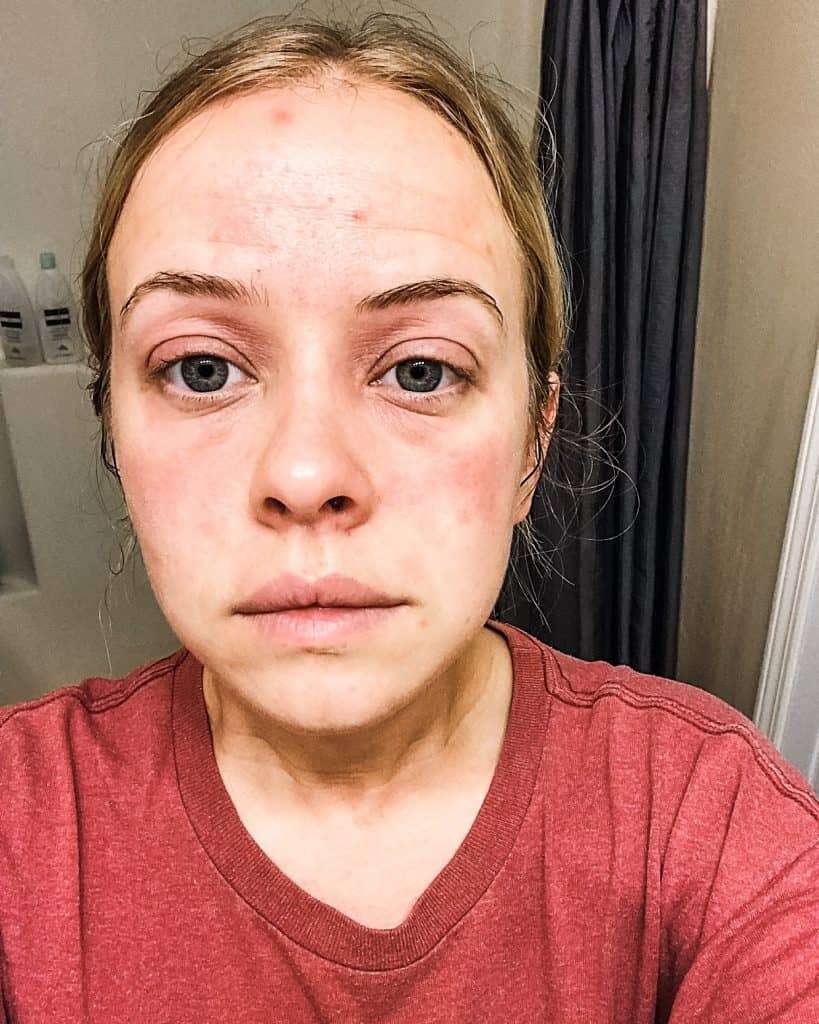

Every single time I went to the doctor for my atopic dermatitis I got the same response: “eczema isn’t caused by food, it could be anything your skin is contacting though. Here’s some steroid cream.”
It turns out that the main thing causing my eczema was the steroid cream I was prescribed. I put steroid cream on my skin for eight years. I didn’t lather myself in steroid cream (thankfully), but I did use a small amount on all of my eczema patches about every two days.
Have you ever read that “discontinue after two weeks of use” statement in microscopic font on the pamphlet inside the steroid cream box you probably threw away? That statement is there because your skin can literally become addicted to the steroid cream if use it for more than two weeks.
Cortisone Eczema
Cortisone creams and ointments were causing my eczema, because they are addictive. I was addicted to the topical medication I was being prescribed.
So, if I went two days without the cream, the eczema came back because the itchiness and rash were side effects of withdrawal. All the chemicals and preservatives in the steroid cream also threw my skin microbiome off-balance, exacerbating my symptoms.
Staphylococcus aureus and Eczema
One time in college I cultured my own skin microbiome out of curiosity. I took samples from various eczema patches on my body, grew the microbes in broth, and isolated them on Petri dishes.
The isolated microbiomes of my eczema patches all had something in common: they were predominately made up of Staphylococcus aureus.
Now let me clarify, I didn’t have a staph infection. Staphylococcus aureus had become the most popular part of my normal skin microbiome, especially on all the itchy parts of my skin.
All the parts of my skin where I put chemical-heavy steroid cream. The chemicals and preservatives in the cream basically wiped out all the beneficial microbes on my skin, leaving my skin mostly colonized with resistant Staph aureus.
Staph aureus bacteria also produce delta toxin, a toxin that causes eczema.
I started asking so many questions about the root causes of my eczema. I would spend hours on google scholar reading published papers on eczema and S. aureus.
There were a lot of nights where I was up until 2 am reading about the causes of eczema trying to figure out what things related to my own eczema… But most of the information I found still said that eczema is incurable. I wasn’t going to give up though.
Natural Ways to Cure Eczema
The first thing that had to change was my terrible diet. I was starting to learn about the human gut microbiome at LSU, but there was so much not covered in class. The age of microbiome health was just beginning as I was graduating. Luckily, I could still understand the complexity and importance of my own microbiome in my health.
So the first thing I changed was my diet. When I was in college, my roommate and I loved to eat hot wings, pizza, mac and cheese, corn dogs, and bagels.
We’d eat this way after putting away a bottle of wine or two… obviously not good for skin, gut health, or mental health. You live, and you learn, though.
When I graduated college in 2014, I moved into an apartment alone, and living alone helped me to dive into a healthy lifestyle. My diet changed in gradual stages, and I learned more and more about my body with each passing month.
For my diet, I tried eliminating food groups, supplementing things, being vegan, gluten-free, and dairy-free. I tried growing my own food and making my own skincare… and eventually, I learned enough about my body to know what I needed to avoid and what my body needed to thrive.
Besides food, one of the hardest things I had to relearn is what true skincare really is. My main hindsight pro tip: if you’d be poisoned from putting it in your mouth, don’t put it on your skin. (Keep reading to find out my skincare routine below!)
After a three-year health adventure focusing on diet, gut health, controlling skin inflammation, skin microbiome health, and hormone balancing (all these things are covered below), I have fully CURED my own eczema.

Foods that Cause Eczema
The main foods that can cause eczema are highly processed foods with chemical preservatives, foods with hydrogenated oils and seed oils, foods with GMO and monocrop ingredients, CAFO farmed meat, meat and fish fed GMO grains, and foods with artificial colors and flavors.
These are the foods that I completely cut out of my diet, and still do not eat.
The major change in my skin health came after we started Cultured Guru. About half a year into business owning, we began to eat fermented foods with breakfast, lunch, and dinner.
We wanted to create recipes with fermented foods for our blog daily, so we had to start getting creative with ways to incorporate fermented foods into almost every meal. This, along with environmental concerns led me to go vegan for a while.
I was fully vegan and about 75% raw vegan for a year, while Jon was primarily vegetarian. My intake of fermented foods and vitamin-rich plants increased tenfold, and my skin health improved tenfold. But the benefits didn’t last.
I was on a mostly vegan diet for a few years, eventually becoming malnourished, vitamin and mineral deficient, and unable to handle stress. My gut health declined and my hormones were imbalanced causing debilitating menstrual cycles.
I now identify my diet as plant-based, but I eat many nourishing animal foods daily. I eat lots of grass-fed butter, milk, cheese, and yogurt. I thrive on eating sourdough daily.
I enjoy wild-caught fish and regeneratively farmed meat every day. I love raw oysters and steamed mussels for vitamin and mineral-rich nourishment. I eat pasture-raised eggs daily for breakfast to help with vitamin D absorption. My hormones are perfectly balanced, I am perfectly nourished, and I feel the best I’ve ever felt in my life. You can read more about my plant-based dietary views here.
TSW Eczema (Topical Steroid Withdrawl)
I ditched the Steroid Cream & voluntarily went through withdrawal. Once I found a skincare routine that works, I stuck to it! Since then, I have not tried any new skincare.
If you’ve used steroid cream for an extended period of time, talk to your doctor about stopping. Stopping extended use of steroid cream means you will withdraw from it because it is an addictive drug.
Also, if you choose to quit the steroid cream and go through withdrawal, prepare to look like a molting lizard… in the driest desert. Prepare to be so itchy you feel insane and to be in pain.
I personally broke out in multiple rashes and had chills. It was not easy. I have an incredibly supportive and loving husband who helped me through this.
It took about 3 weeks total for the withdrawals to stop. After that, I looked like a whole new person.
My skin was actually glowing for the first time, and all of the eczema was gone! Until I got too excited and tried some face serum I had never used before. That’s when eczema returned to my eyelids. I obviously discontinued the use of the face serum, and once again, I’m eczema free!
Here are photos of my puffy, inflamed skin and face and my hives during withdrawal.
The worst thing for me was not being able to open my eyes fully. My left eye was always more inflamed than the right, making me look disproportionate and disfigured.



How did I cope and care for my skin while going through withdrawals? With the most natural skincare products and a lot of self-control.
I also gave up all makeup for a few months. I wore no make-up at all for about three months, then gradually added back in mascara and my eyebrow pencil. Now I use Toups and Co. Organics makeup with no problems!
Note: none of the products mentioned here are done so as an advertisement. I tried the two main components of my skincare routine by my own will, on suggestions from friends. I love these products, and I am a lifelong customer.


My TSW Skincare Routine
- Moisturize with simple natural ingredients
- during withdrawal I only used Sweet Girl Tallow Balm from Toups and Co. Organics This is what saved my skin through the withdrawal process.
- (update 2021) I now use my homemade tallow balm and the pomegranate argan face oil from Chagrin Valley for moisturizer.
- Facial Steams, then moisturize
- I like to do a facial steam with green tea leaves and hot water. Simply add hot water to a bowl with green tea. Drape a towel over your head and create a mini sauna for your face over the bowl. This opens the pores and allows for better absorption of moisturizer.
- I used soap in extreme moderation
- During topical steroid withdrawal, I used soap only once a week. While healing, I only washed the necessary body parts with soap daily (i.e. armpits, butt, vagina). I rinsed everything else with warm water. I bathed my whole body with soap only once a week (face included). I think this was vital in rebuilding my skin microbiome. The soap I use is from Chagrin Valley Soap and Salve. My favorite is the Adzuki bean soap, which has a lot of ingredients that can help boost the good microbes on skin. I love this company, and it’s especially convenient that they have sample sized soaps you can buy to test out!
- Exfoliating for Eczema
- I used a soft bamboo bristle exfoliating brush. While withdrawing, I dry brushed all my eczema patches and in the shower I used it with just water, no soap.
Can Birth Control Cause Eczema?
Yes, hormonal birth control can cause eczema. Eczema induced by hormonal birth control usually occurs right before menstruation begins, when progesterone levels are at their highest for that menstrual cycle.
Taking birth control pills also increases the likelihood of autoimmune progesterone dermatitis, even after you stop using them.
At the beginning of 2017, I quit taking hormonal birth control. This has been a vital element in healing my eczema. I am NOT suggesting this to anyone. Everyone is different, with different needs. If you are interested in quitting hormonal birth control, talk to your doctor about your options!
How long did it take to heal my eczema naturally?
Overall, revamping my health and healing my skin was a three-year adventure. I didn’t have a guide book, and I just desired to be more healthy and balanced.
Overall, I wasn’t sure what I was doing or what I needed to do, and it took time to figure it out. The last step was quitting steroid cream and going through withdrawal.
After all areas of my lifestyle that could affect my skin health were improved, it took approximately 2-3 months for my eczema to disappear forever. If I had known what to do and made all of my lifestyle changes at one time, I’m guessing it would have taken anywhere from 2-6 months to heal completely.
More Blog Posts on How I Healed My Eczema Naturally
- My Eczema Diet Plan and The Best Probiotics for Eczema
- My Natural Eczema Skincare Routine That Healed My Skin
- Tallow Balm Recipe for Eczema Relief
Reference Materials
What lives on our skin: ecology, genomics and therapeutic opportunities of the skin microbiome
Microbiota in Healthy Skin and in Atopic Eczema
Structure and function of the human skin microbiome
Evidence that Human Skin Microbiome Dysbiosis Promotes Atopic Dermatitis






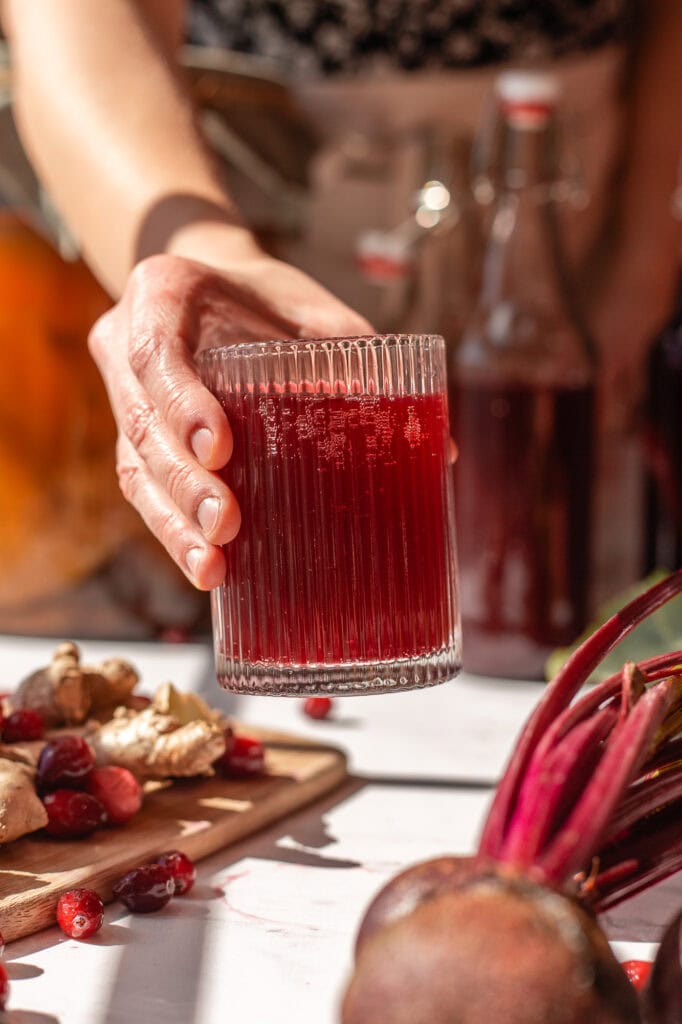





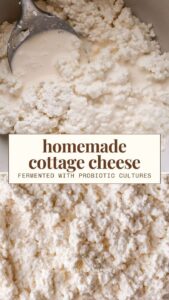
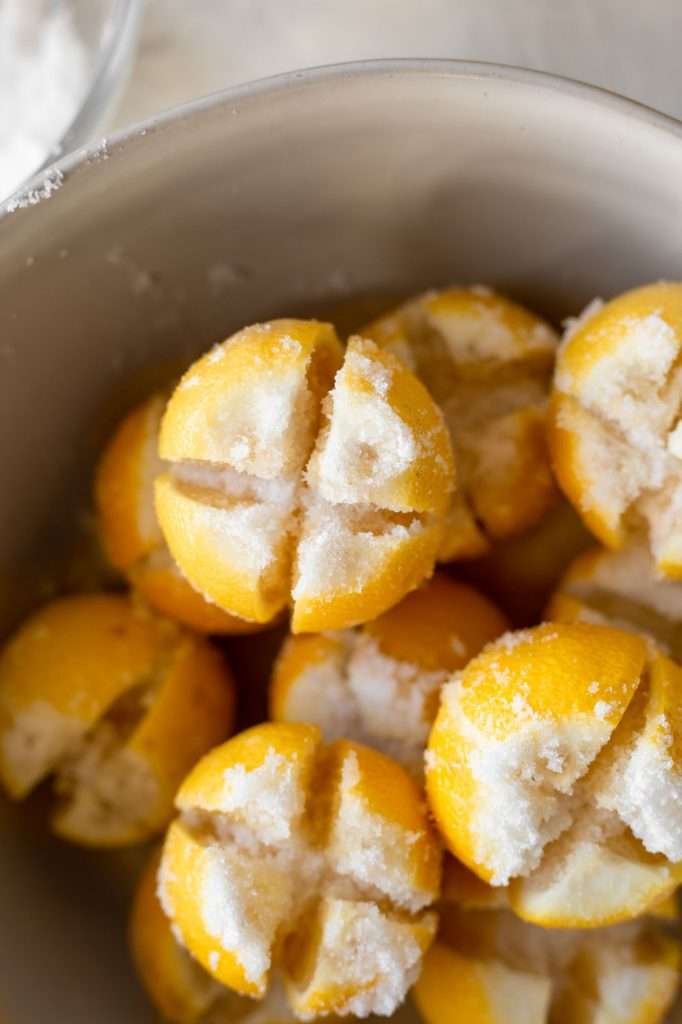

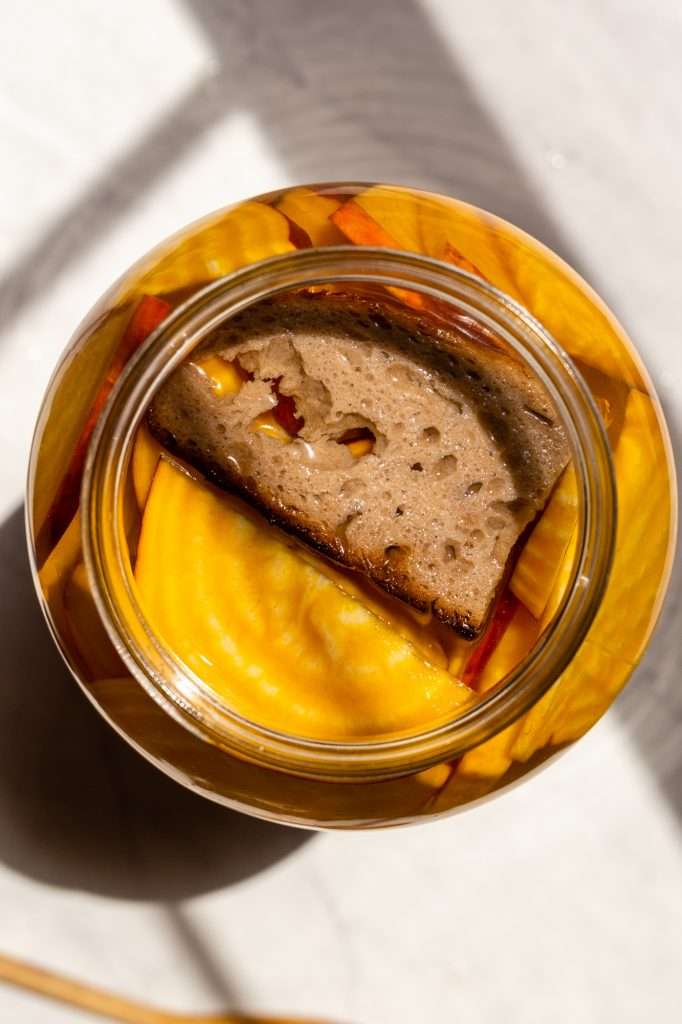

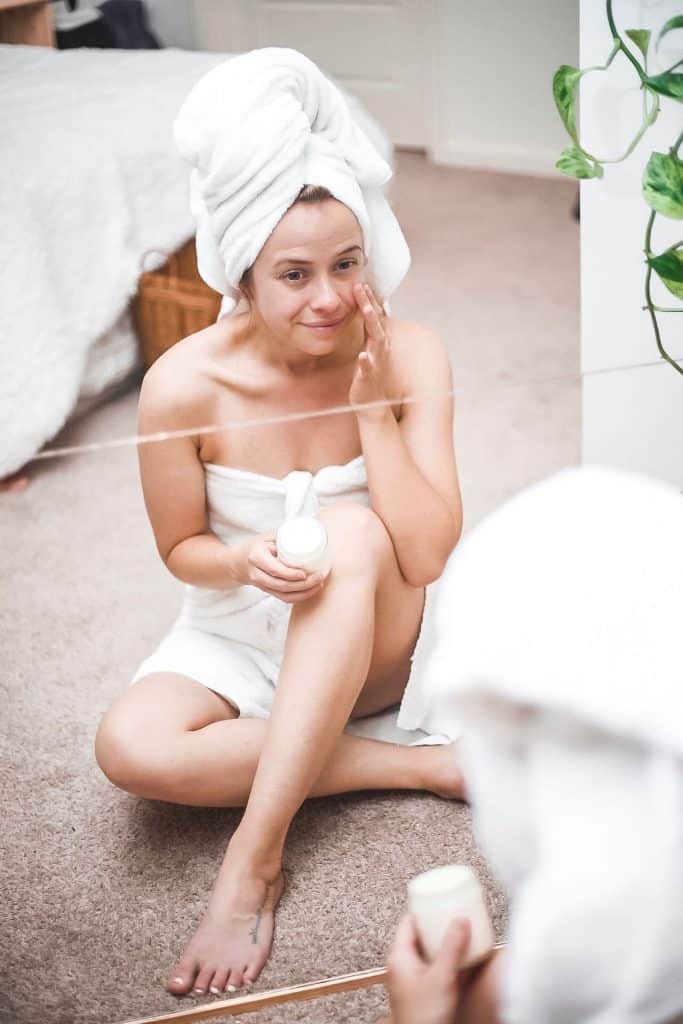
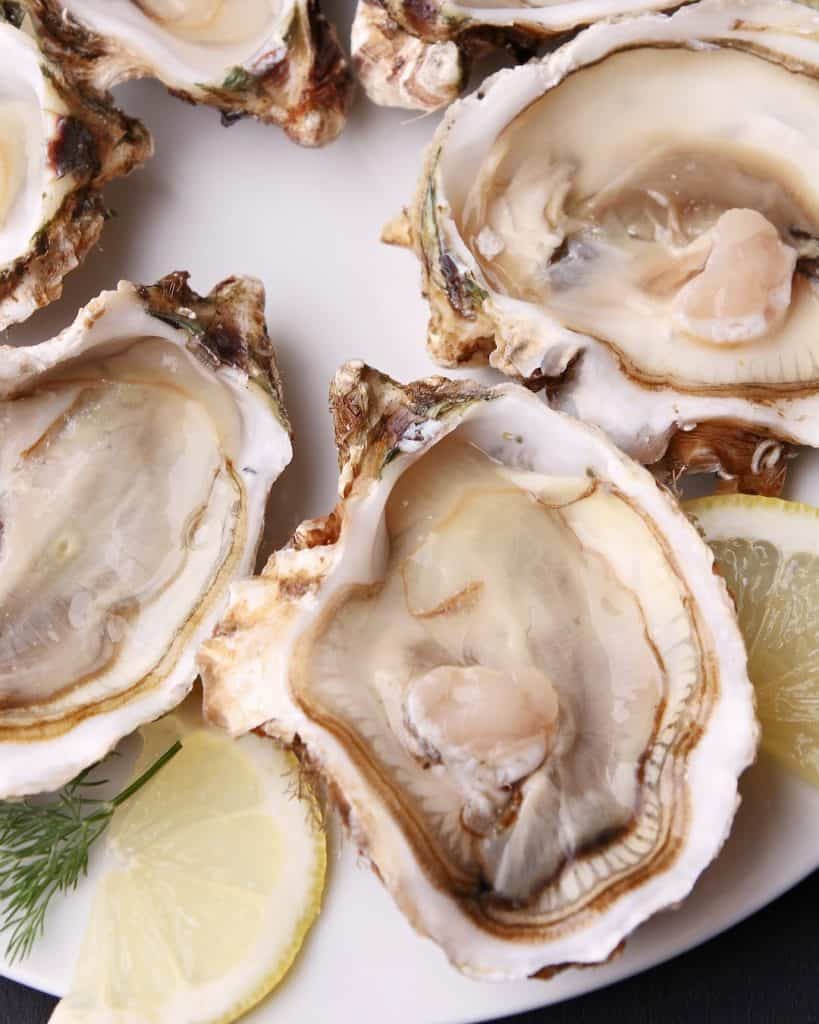

Thank you so much for this post, it’s give me hope, it’s my first time dealing with inflammation skin and I feel hopeless.
I have one question:
Do you use that sope for your face also?
Or just for the body?
Yes! I use that soap for my face and body.
Trying to find part 2 of this cause reading about what I’ve recently uncounted feels so draining and so alone!!
I’ve actually come off the pill and my face has broken out with acne but was inflamed and around my mouth was eczema/ dermatitis… strange cause I’m already 80 % plant based and use natural products!! Now I’m going to a skin specialist and go for my first peel. Upset I’m using harsher chemicals but seems to have worked for some and I guess I can’t loose anything ??♀️ Feels like such a long and draining process ?
Hello! I’m currently adding photos to part two of this blog, and I’m planning to have it posted around 3pm today. And I’m hoping to have the other two parts that follow posted within the month. We’ve had a hold up in our blog posting schedule lately since we’ve been dealing with the expansion of our fermented foods business. Thanks for understanding the delay! Going off of birth control is tough, I suffered with acne and hair loss for almost 8 months post pill. The most important thing is balancing your hormones, a healthy diet and EXERCISE. I can’t stress the exercise enough. It wasn’t until I started doing HIIT workouts 4 times a week that I stopped suffering from the effects of going off the pill. After the eczema blog series is complete I have a blog to post about the pill, menstrual cups and vaginal microbiome health. ??
Great article. I can relate to all your symptoms but not as extreme.
My diet has recently turned ‘lazy’
And not sweating like I use to either and life style has changed.
I too had a staff infection in my noise which has cleared but suspected a connection.
I not getting prescription cream from the doc but just changing my lifestyle. ?
Thank you, thank you, thank you!! I am so glad I found this post. My daughter has been having red, itchy skin on her hands and I took her to the pediatrician. He prescribed a steroid cream. I was really not wanting to use it but was not sure what else to do. My daughter was diagnosed with Marfan syndrome when she was young, a connective tissue disorder that makes her more at risk for glaucoma. I am so glad I read this before I began giving her the steroid cream. Thank you for putting this post up. One of the only things that has helped her is aloe straight from the plant.
When you said the part about going off hormonal birth control, my jaw dropped. I’ve had eczema really bad twice, both when I’ve worn tight clothing (hiking socks and a knee brace) and I scrolled back in my period tracking app and realized that my two bad outbreaks happened within a month of when I started the ring (hormonal bc). Thank you for not leaving that part out!
Great that you have put your eczema out there and have given advice on what helped you 🙂 I suffered for years with eczema and only recently got rid of it after using a calendula based eczema cream with essential oils like east cape manuka and geranium. I bought it on-line. I do feel like you that natural products often work better for eczema.
Hi there, I was wondering if I might be able to contact you privately about my facial eczema. I have got to a point where I have tried everything and nothing is working and I don’t know what to do next. Michelle
Hello!
You can email me at [email protected]
However, I cannot provide you with medical advice. I can only tell my story and what worked for me.
Hi after reading this blog I feel some kind of hope for clearing my eczema and I actually might consider the steroid withdrawal but since I’ve used steroids to treat my flare ups so regularly I’m afraid of leaving my stiff patchy skin dry untreated.Do you have any tips or the estimated time my eczema will clear up after leaving steroids?
Hey,
I cannot advise you on what you should do for your own skin. This is just my personal story and what worked for me. There is a 2nd and 3rd part to this blog post that covers my dietary choices and skincare routine during and after my steroid withdrawal.
Thank you so much for sharing this! Now i feel excited to actually deal with my eczema, knowing that your,s is totally gone. Tbh i felt like there was no hope to heal my eczema because everytime i search it up on google it says that it’s incurable, but seeing you being free from eczema just gave me hope 🙂 once again THANK YOU
Hi Kaitlynn, amazing blog. Eczema is absolutely crushing, so it’s nice to know some people have found their own ways around it.
When you say your withdrawals took 3 weeks total to stop, do you mean your skin was clear by 3 weeks or just that it didn’t get worse? I’d like to try withdrawing from steroid use, but I know for my case, I’ll need to plan some time off work and social activities. I know your journey may not be the same or even similar to mine, but it’d be nice to get a bit of a reference point.
Also, what do you think of going through the withdrawal process on one part of the body but allowing steroid use on other parts? To me, an all-or-nothing approach makes more sense since the body is a whole unit, but just wanted to get your thoughts.
My skin got worse initially. The worst of it was the end of week one for me. I had hives, peeling skin, cracking skin, and extreme itch. But I stuck to my skincare routine, and just wore sunglasses and hats in public. By week three my eczema was gone. I feel like my optimal gut health had a huge role to play in how quickly my skin healed.
I threw all my steroid cream away and never looked back. For people who use steroid cream more generously than I did, or for anyone considering going through TSW, I always suggest asking your doctor about going through a gradual withdrawal or wean-off.
Thanks so much for the insight. How did you manage the extreme itch?
Which face wash and moisturizer did you use?
Hi there, this is all listed in the blog under the section “develop a skincare routine”
Hey thanks so much for this post,
I really appreciate it and glad you’ve found your healing path ! 🙂
You’re welcome! glad you enjoyed this blog post.
Great bloggs – i haven’t had a chance to read them all yet so apologies if what I’m about to say is mentioned – I just wanted to add that your skin is apparently the biggest organ of your body and is often known as your third lung so exercise and water is definitely the key along with creating good gut flora. Well done for persevering with your instincts and not listening to Drs who always think they’re right – they are only regurgitating what they “learn” (aka are “told”) at university so you can’t really blame them I suppose – although I do blame them for not thinking outside the box sometimes- and who are these medical universities funded by – a large proportion are by Pharmaceutical companies – do you see it now? Well done for speaking out. So refreshing!
Thanks. In this blog post, right above where you can leave a comment I talk about exercise and hydration.
Also, nothing here is suggesting that people should “not listen to doctors”
This blog is not medical advice and does not take the place of consulting a physician about medical issues, such as eczema and TSW.
Hi Kaitlynn,
Thank you so much for sharing your personal experiences on your skin healing journey. I’m just wondering how long did you eat fermented foods to see any progress with your skin?
Check out the section of this blog post with the heading “How long did it take to heal my eczema naturally?”
This is interesting and inspiring! Funnily enough, lockdown completely relieved me of the eczema I’ve had on my hands my entire life…despite how much I washed them (sometimes with normal soap)! But now I’ve got a flare-up on my face, weirdly enough. I’m not sure I believe in being able to ‘cure’ eczema. A lot of different things can cause flare-ups, like the weather, stress and hormones. So having dietary and skincare changes I’m sure can be useful, but might not be effective for many people. I’m totally going to try dietary changes to experiment, because changing my skincare is having no effect!
Glad you enjoyed it! You don’t have to “believe” in curing eczema. This blog is not a blanket protocol for others, it does not say that everyone can cure their eczema, nor is it advising others on what to do. It is MY personal experience, and I was able to cure ~my own~ eczema.
Some people may not be able to due to environment, lifestyle, work environment, stress levels, and individual circumstances. That’s why I included “While reading this blog, remember that everyone’s body is different. What is best for your skin and health, might not be exactly the same as what was best for my own. This is just my personal story.” at the very beginning of this blog.
Good luck with your eczema and I hope you find relief!
Thank you so much for posting this. So inspiring and I’m going to definitely take notes on everything you mentioned!
Hi.
Thank you for the write-up. I’ve had eczema all my life and just like you wrote, topical steroids are normal ingredients in my body cream, I mix them in, because whenever I stop, my eczema comes back. I’m so tired of my skin, I. live in Nigeria, a country in Africa where there’s much heat and stress. I’m a student also and I spend most of my money on my education and not much is left for skin and healthy eating, though I try as much as possible to keep my skincare routine simple by using a lotion mixed with 1% hydrocortisone.
You talked about fermented food and becoming a vegan, there aren’t much vegan foods over here and I don’t know how to go about fermented foods. Plus, what type of foods exactly?
I’m planning to stop my body lotion and go for a very thick moisturizer mixed with hyaluronic acid and vitamin c serum plus a sunscreen though the money will be too much as I’m still a student, but I’m tired of my skin condition. Do you think that’s a good idea?
Please, I would love a response and elaborate ideas on foods to eat and not to eat considering my community.
Thank you.
Sorry to hear you are struggling with eczema! I cannot provide you with medical advice or dietary guidance, as I am not a physician and everyone’s body and situations are vastly different. This blog just tells my personal story healing my own eczema.
As for being a vegan, I tried that for a while but I am not a vegan. I do eat a lot of plant based foods like beans, rice, and cooked vegetables. I have many recipes on our blog here for making fermented foods at home.
Love your story and would definitely try your regime. I have started to have eczema recurrence after C19 vaccine early last year and now it affect my face majority of time.
Hi there,
I abruptly stopped TS in March but become really unwell with the withdrawal and had no help from Doctors as refused to acknowledge TSW and still do. Sadly it got too much I had to go back onto Eumovate I’m now weaning off again it’s not as bad as abruptly just stopping however it’s still challenging and my life has become the eczema that’s all I can focus on is trying to heal whilst still holding down a job and family life. I’m trying the eczema life diet strategy but the diets are extremely limiting and hard with very little choice. Can you give me any tips to help with the TSW process I also bathe daily is this no good for me it’s the only way I get comfort just completely taken over my life.
I’m sorry you’re having to go through TSW. It’s extremely difficult and can definitely shake up your life. I’m sorry but I cannot give you personalized health advice. I’m not a doctor and can only share my own story here.
Hi! I found your website via Pinterest. My daughter has eczema very similar to yours. Started when she was young and has progressed since then. Last year we sought out a functional medicine doctor and went through Cellcore, which is a detox program, alone with other detoxes and dietary changes mostly DF and GF. This helped her dyshidrotic eczema on her hands immensely. She still has patches but is much better compared to before it was covering her entire hands. She also still gets it in the creases of her elbows and back of legs and face and scalp if she uses any type of product that is irritating. Also hers is much much worse in the summer time, just curious if yours is like that as well. Do you think this is something an 11 year old could do? Dietary changes are hard, especially when all your friends are eating all the junk food.
I can’t say if it’d be good for your daughter because everyone’s skin is so different and I’m not qualified to give you medical advice. All I can do is share my own experience. You should ask your trusted healthcare person!